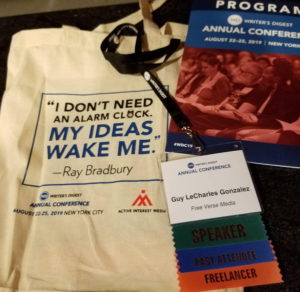Sign up to get this as a fancy email newsletter whenever it comes out: As in Guillotine.
_ONE
Twitter is becoming a lost city | Annalee Newitz
“That’s because the collapse is coming to Twitter. I’ve seen it before: I watched Friendster and MySpace die at the turn of the century, their once-vibrant memes decaying in abandoned accounts, comments rotting into spam. If you’ve been on Twitter as long as I have, which is going on fifteen years, you’ve seen the signs too.”
I’ve had this one bookmarked in Instapaper since I was on vacation over the summer, rediscovering it when I got an unexpected email this week celebrating my “19 anniversary in LiveJournal” — a platform I hadn’t thought about in at least 10 years and didn’t realize was still around — which made me realize I hadn’t checked my Instapaper account in weeks. Or months, apparently.
While Twitter remains my social network of choice for now, my engagement there has been declining over the past few years, and the maybe/maybe not impending takeover by Nole Ksum has had me thinking about alternatives. My own blog will become more important again (this newsletter was primarily an excuse to start writing again and is preserved there), and I might have to revive my Feedly account to stay connected to specific sources, and maybe Instapaper replaces the mindless doom-scrolling that’s become Twitter’s main use case of late?
The serendipitous engagement and conversations that happen between overlapping communities on Twitter isn’t really supported elsewhere, though, and it’s what I’ll miss the most.
__TWO
We need to talk about podcast listener numbers | Esther Kezia Thorpe
“I’m here to tell you most podcasts probably get fewer listens than you think. That’s not a bad thing. But unless we begin to be more open about what to expect when launching a show, we’ll start to see publishers come under pressure to inflate numbers in order to keep up with unrealistic BS figures.”
I believe the pivot to audio was replaced by the pivot to newsletters, but there’s still a lot of money being thrown at podcasts despite the ability to measure their reach and ROI remaining sketchy at best. Thorpe combines some useful data and clear insights that help put podcasts in the right context — whether you’re producing one as part of a content marketing strategy, or investing your marketing dollars in someone else’s as an advertising channel.
The comparison to events is an interesting one, although I’d align them more with sponsoring (or speaking) at virtual events rather than live events because of the lack of direct engagement. There’s no booth in a podcast, and that tracked URL isn’t the same as scanning a badge to collect leads.
Funny enough, I was actually leaning towards finally launching a podcast this year, but the looming possibility of walking away from Twitter, which would be one of my main marketing channels, makes that highly unlikely at this point.
___THREE
After the newsletter boom | Brian Morrissey
“The newsletter mini-boom brought with it plenty of platforms who wanted to become new middlemen, even if they sang the praises of individuals striking out on their own. The unbundling is always followed by the rebundling.”
Speaking of the pivot to newsletters, it looks like the dust is starting to settle in that realm, too, as starry-eyed dilettantes and clueless execs realize there’s more to it than just having some engaged followers and a platform that makes sending out emails easy.
Morrissey makes a compelling case for viewing Substack as a legit platform that’s finally building an audience of its own rather than a glorified, well-financed WordPress clone with millions of email addresses delivered to them by heavily subsidized writers chasing independence, and non-subsidized writers chasing hype.
If you’re not feeling Substack, Wired put together a solid overview of legit alternatives. As a Revue user, I wouldn’t recommend it to anyone serious about developing a paid newsletter offering, especially since it’s owned by Twitter and there’s no telling what will happen to it once you-know-who gets his hands on it.
____FOUR
Where Is All the Book Data? | Melanie Walsh
“Corporate data already deeply influences the contemporary literary world, as revealed both here and in the broader essay series. And so, if you care about books, you should probably care about book data.”
I’ve written about the lack of transparency around book sales data many times — most notably how it obscures reliable attribution and libraries’ true impact — but Walsh has written the article I’ve wanted to write for a long time, and does a better job putting the bigger picture together than I would have.
Every time you cite BookScan data without context, an angel loses its wings.
_____FIVE
PS, The Preventive Maintenance Monthly | Wikipedia
“PS: The Preventive Maintenance Monthly is a series of United States Army technical bulletins published since June 1951 as a monthly magazine with comic book-style art to illustrate proper preventive maintenance methods. The magazine’s title derives from its being a ‘postscript’ to technical manuals and other published maintenance guidance.”
Besides being one of my favorite examples to bring up whenever people want to claim comics are for kids and/or have no nutritional value, PS: The Preventive Maintenance Monthly also brings back fond memories of my stint in the Army as a light-wheel vehicle mechanic in the early ’90s. As a comics-loving kid who grew up reading everything, including cereal boxes, I remember being surprised PS even existed.
I was even more thrilled recently when I found this archive of what appears to include a copy of all 800+ issues published from 1951-2019! I wish something like this existed for regular cars, specifically 1965 Corvairs. :-/
Do you like email?
Sign up here to get my bi-weekly "newsletter" and/or receive every new blog post delivered right to your inbox. (Burner emails are fine. I get it!)



![Read more about the article [FLASHBACK] The Future of the Blog: Robots Win](https://loudpoet.com/wp-content/uploads/2025/05/Made-for-the-library-300x115.jpg)